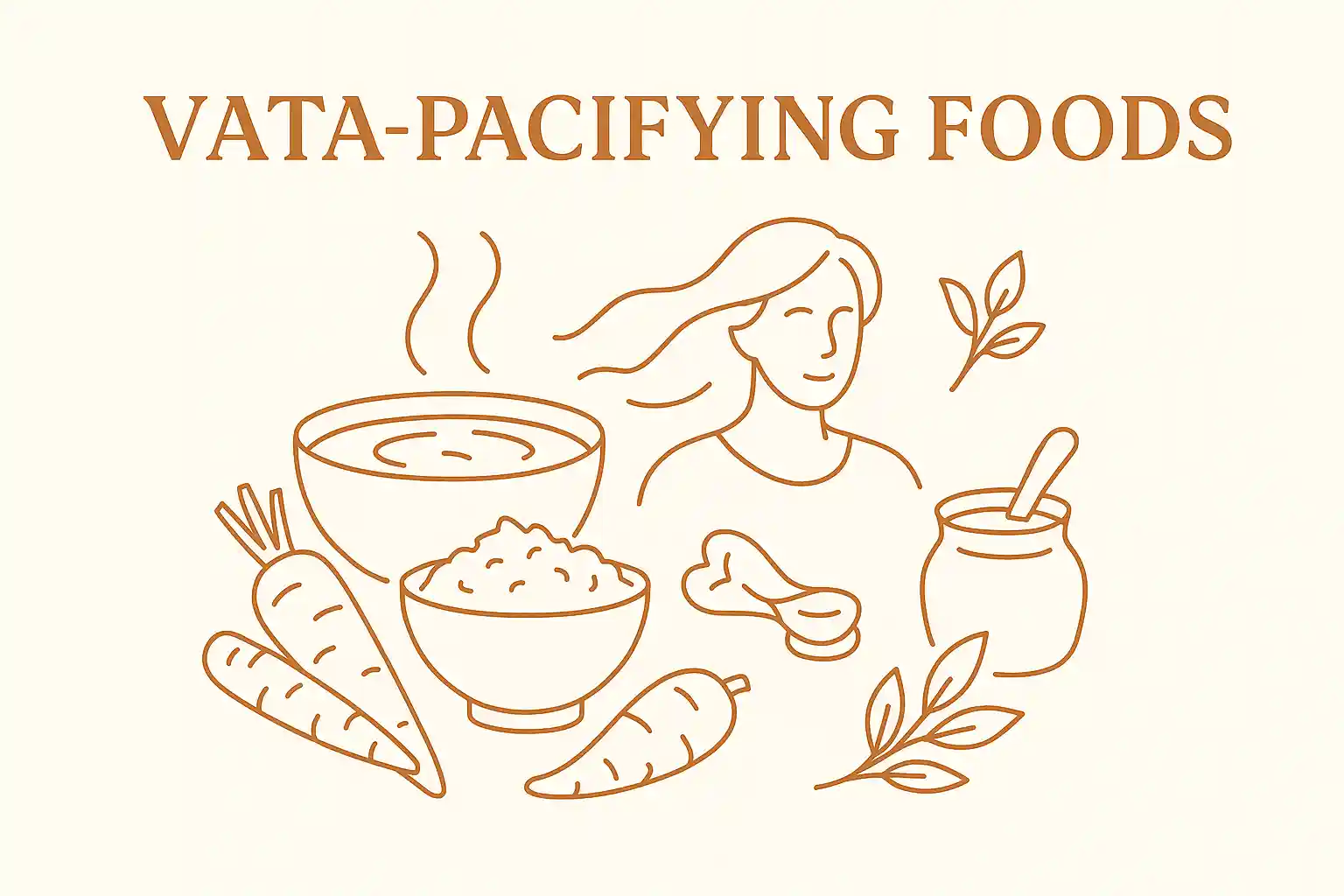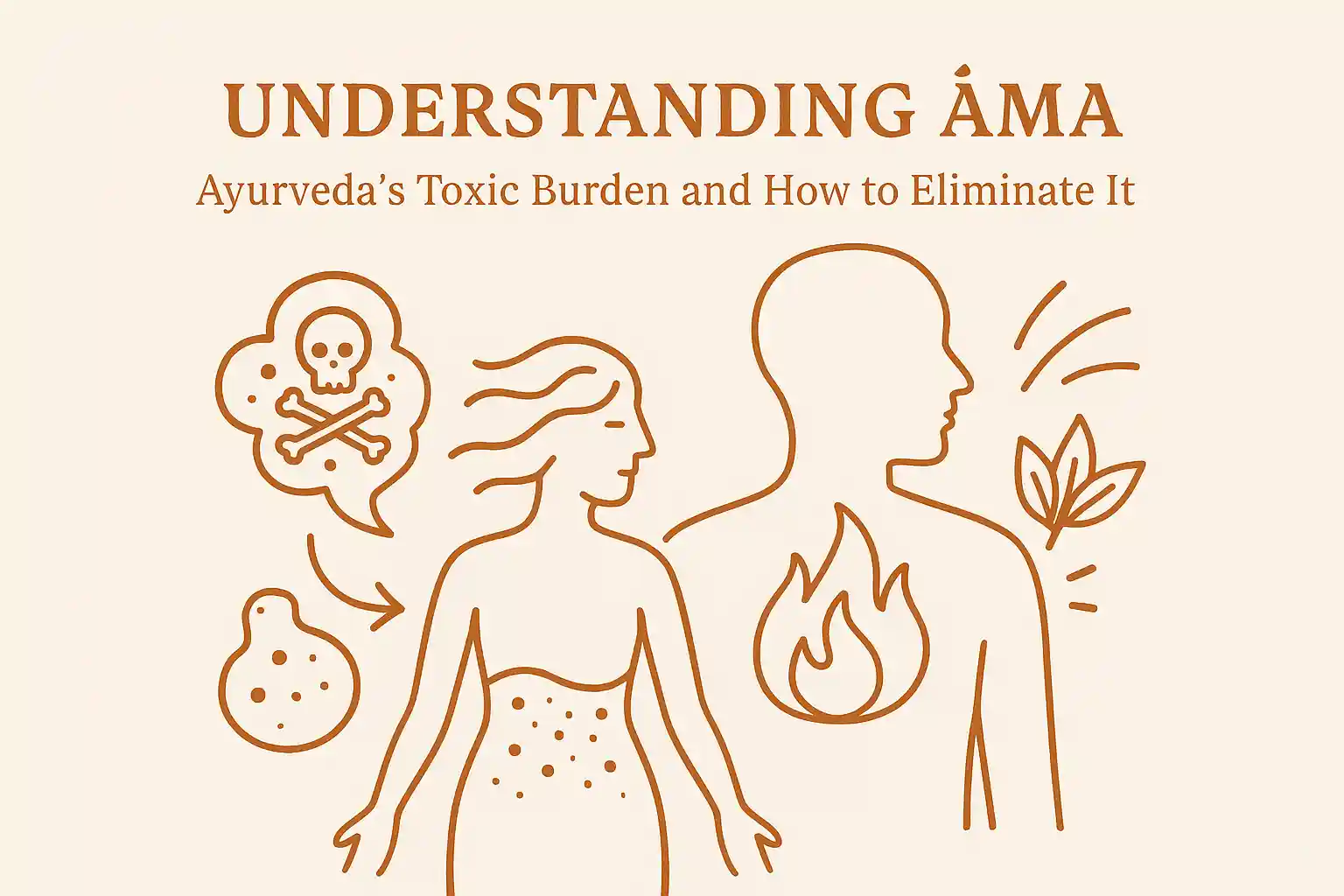Bloating affects millions of people daily, causing discomfort, distension, and digestive distress. While modern medicine often treats symptoms, Ayurveda addresses the root cause by understanding bloating as primarily a Vata dosha imbalance—an excess of air and space elements in the digestive tract.
This comprehensive guide will show you how to use Ayurvedic dietary principles, therapeutic spices, and mindful eating practices to naturally reduce bloating and restore digestive harmony.
Understanding Bloating Through Ayurveda
In Ayurveda, bloating is primarily understood as a Vata imbalance—an accumulation of air and space elements in the gastrointestinal tract. This creates the characteristic symptoms of gas, distension, and abdominal discomfort that many people experience.
The root issue often lies in weakened Agni (digestive fire), which results in incomplete digestion and the formation of Ama (digestive toxins). This aligns closely with modern understanding of bloating causes including indigestion, microbial imbalance, food intolerances, and stress.
Signs of Vata-Related Bloating
- Gas and abdominal distension
- Irregular bowel movements and constipation
- Cramping and intestinal discomfort
- Feeling of incomplete digestion
- Symptoms worsen with stress or irregular eating
Ayurvedic Diet Principles for Bloating Relief
Nourishing Practices to Embrace
The foundation of an anti-bloating Ayurvedic diet focuses on foods and practices that pacify Vata and strengthen digestive fire:
- Eat warm, moist, freshly cooked meals that are easy to digest
- Maintain regular mealtimes and eat only when genuinely hungry
- Choose cooked over raw foods to reduce digestive burden
- Include healthy oils like ghee or sesame oil for lubrication
- Focus on easily digestible grains such as rice and oats
Foods to Avoid for Bloating Relief
Certain foods can aggravate Vata and worsen bloating symptoms. Additionally, incompatible food combinations are a major cause of gas and digestive discomfort:
- Cold, raw, or dry foods (including raw salads)
- Gas-producing vegetables: cabbage, cauliflower, broccoli, beans
- Cold drinks and carbonated beverages
- Dry snacks, crackers, and over-processed foods
- Leftover or reheated meals

Vata-pacifying foods: warm, nourishing meals with root vegetables, cooked grains, and digestive spices
Therapeutic Spices and Herbal Allies
Ayurvedic spices play a crucial role in rekindling Agni and reducing gas formation. These natural digestive aids have been used for thousands of years:
Essential Anti-Bloating Spices
These therapeutic spices primarily provide pungent and bitter tastes that help kindle Agni and reduce Vata imbalances. Understanding how different tastes affect your digestion and dosha balance is essential for optimal therapeutic benefit.
- Ginger: Boosts digestive fire and relieves intestinal cramps
- Cumin & Fennel: Natural carminatives that reduce gas and bloating
- Peppermint: Soothes intestinal spasms and digestive discomfort
- Hing (Asafoetida): Traditional anti-gas remedy with powerful digestive properties
- Ajwain (Carom seeds): Stimulates Agni and relieves abdominal discomfort
- Turmeric: Supports liver function and reduces inflammation
Ayurvedic Herbal Formulations
- Trikatu: Classic blend for sluggish digestion
- Triphala: Tones digestive system and regularizes elimination
- Hingvastak: Traditional formula specifically for gas and bloating
Anti-Bloating Meal Planner
Generate a personalized meal plan specifically designed to reduce bloating using Ayurvedic food combining principles. This planner focuses on Vata-pacifying foods and proper combinations to minimize gas formation.
Sample Daily Routine and Meal Plans
Morning Routine
- Begin with warm water infused with fresh ginger and lemon
- Practice gentle yoga or take a short walk to awaken digestion
- Wait at least 30 minutes before eating breakfast
Breakfast Ideas
- Warm rice porridge with ghee, fennel, and cardamom
- Stewed apples with cinnamon and ginger
- Oatmeal cooked with warming spices
Lunch (Main Meal)
- Steamed vegetables seasoned with cumin and turmeric
- Moong dal soup with ginger and hing
- Basmati rice cooked with digestive spices
Dinner (Light and Early)
- Kitchari (mung dal and rice porridge) with digestive spices
- Light vegetable soup with warming herbs
- Herbal tea with fennel or ginger
Before Bed
- Triphala tea for gentle detoxification
- Warm turmeric milk with a pinch of black pepper
Lifestyle Practices for Digestive Health
Mindful Eating Guidelines
- Create a calm eating environment: Sit down and avoid distractions like TV or phones
- Chew thoroughly: This stimulates digestive enzymes and reduces gas formation
- Limit liquids during meals: Drink water 30 minutes before or after eating
- Take a gentle walk: Light movement after meals supports healthy motility
Daily Routine for Vata Balance
- Maintain regular sleep and wake times
- Practice stress-reducing activities like meditation or gentle yoga
- Keep a consistent daily schedule
- Stay warm and avoid excessive cold exposure
Modern Dietary Insights and Ayurvedic Wisdom
While modern approaches like low-FODMAP diets can provide temporary relief, Ayurveda offers a more comprehensive understanding that addresses root causes rather than just managing symptoms. When digestion functions optimally, it not only prevents bloating but also builds Ojas (vital essence) for strong immunity and sustained energy.
Integrating Modern and Ancient Wisdom
- Gut health support: Include probiotic-rich Ayurvedic foods like spiced buttermilk or lassi
- Gentle fiber: Choose cooked vegetables over raw fiber for sensitive digestion
- Fermented foods: Properly prepared fermented foods can support digestive balance
Frequently Asked Questions About Ayurvedic Bloating Relief
Conclusion: Restoring Digestive Harmony
An Ayurvedic approach to reducing bloating emphasizes rekindling Agni, pacifying Vata dosha, and eating in alignment with natural rhythms. Through warm, easily digestible foods, therapeutic spices, and mindful eating practices, you can address the root causes of bloating and restore lasting digestive comfort.
Remember that healing takes time—be patient with your body as you implement these changes. Start with simple modifications like warming your food and adding digestive spices, then gradually incorporate more comprehensive dietary and lifestyle adjustments.
Related Articles

Understanding Ama: Ayurveda's Toxic Burden and How to Eliminate It
Discover Ama, the root cause of disease in Ayurveda. Learn how this toxic burden forms from weak digestion and explore safe, natural methods to eliminate it through dietary changes and detoxification practices.
9 min read
What Is Agni? A Beginner's Guide to Ayurvedic Digestive Fire
Discover Agni, the vital digestive fire in Ayurveda that transforms food into energy and health. Learn the 4 types of Agni, signs of imbalance, and practical ways to strengthen your digestive fire naturally.
12 min read
